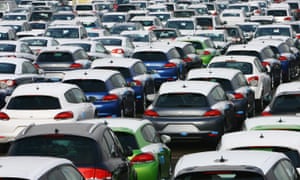Tax new diesel cars up to £5,000 to cut pollution
Jul 01, 2016
Money raised should be spent on improving public transport, cycling and walking, advise researchers

The purchase of highly polluting diesel cars in the UK should be discouraged with a tax of up to £5,000 to help tackle the public health emergency of air pollution,according to a new report.
The policy could be particularly important following the UK’s vote to leave the European Union, which until now has set most pollution rules.
Drivers of polluting cars should also have to pay a charge to enter cities, where air pollution is worst, the researchers from University College London (UCL) said. The revenue raised should be spent on improving public transport, cycling and walking, but not on a scrappage scheme, they said.
Over 40,000 people a year die early in the UK from air pollution, with most areas suffering levels of noxious fumes well above legal limits. Nitrogen dioxide (NO2) is a key pollutant and the Volkswagen scandal led to revelations that virtually all diesel cars emit far more NO2 on the road than in official tests.
The researchers say the purchase of vehicles producing the most NO2 should be deterred by a tax of between £3,500 and £5,000, with today’s average polluting cars paying £1,100-£1,700. Paul Drummond at UCL said ministers are thought to be considering such taxes and that they should be introduced soon: “Given the public health emergency, any action to tackle this as soon as possible is beneficial to public health.”
The registration tax on new cars is already set to change in April 2017, with cars with high carbon dioxide emissions being taxed up to £2,000. Drummond said the NO2 tax should be added on top. EU car regulations failed to cut NO2 emissions as intended, because manufacturers exploited loopholes in the tests, but taxes are easier to implement and adjust, he said.
Action to tackle air pollution is increasing, with the government facing a renewed legal challenge and the new mayor of London, Sadiq Khan, pledging to double the size of the city’s Ultra Low Emission Zone (Ulez) and introduce it earlier than planned.
Drummond said the Ulez currently applies only to pre-2014 cars, but should be extended to those sold afterwards, if they emit more NO2 on the road than in the official lab-based test. Unlike the registration tax, such measures deter driving polluting cars in cities.
Ministers are also thinking aboutincreasing the tax on diesel fuel and further action to stop drivers removing pollution filters from exhausts. Other groups, including the centre-right thinktank Policy Exchange, have also called for pollution taxes on diesel cars.
“Fumes from diesel cars kill people, however indirectly – even from newly-manufactured models,” said James Nix, director of Green Budget Europe, the NGO which commissioned the UCL report.
“The governing EU regulation was weak before the [Brexit] referendum and, after the vote, its future application is uncertain. Taxing diesel cars according to their NO2 emissions is an increasingly feasible way to cut air pollution,” he said.
However, Steve Gooding, director of the RAC Foundation, said the focus should be on clean air zones in cities and emissions regulations. “A registration tax looks like a national solution to what is essentially a local problem,” he said.
“There are nearly 12m diesel cars in the UK but not all are driven in towns and cities, where taxis, vans, lorries and buses are also big polluters. That’s why properly targeted clean air zones make sense,” Gooding said. “We [also] urgently need to have the right technical standards in place alongside a real-world testing regime we can all trust.”
The UCL research estimated that an NO2-based registration tax on diesel cars would initially raise about £600m a year. If this was spent on better buses and trains and increasing cycling and walking, the policy would achieve a double benefit, said Drummond.
But he said a scrappage scheme for older, dirtier diesels, supported by acommittee of MPs and others, was not the best use of the money: “It just brings forward the end of the life of vehicles that would have been off the road anyway in a couple of years.” In April, the government ruled out a scrappage scheme.
New EU rules mean the worst polluting diesel cars will not be allowed to be sold after 2019, with further restrictions coming in 2021 – if those rules apply to the UK then.
But even those permitted after 2021 will emit higher levels of NO2 and could still be charged up to £580 when sold, according to the policy set out by the UCL team. The level of tax is calculated using UK government estimates of the harm to health and the environment caused by the NO2 emitted.
Source: theguardian